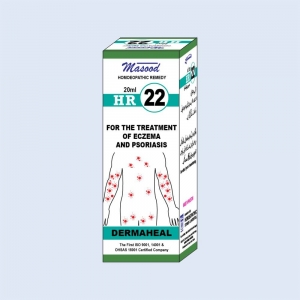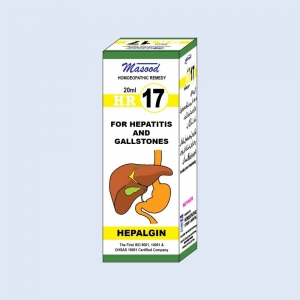Description
HR-76 (COLITISULS) | Homeopathic medicine for the treatment of Inflammation And Ulcers Of Small And Large Intestine by Masood Pharma
HR 76 is used for ulcers of the small and large intestines.
- Indicated in inflammation of the large or small intestine.
- Effective for abdominal cramps and fever.
- Used in bloody diarrhea due to infection.
- Reduces further weight loss and colic pain due to inflammation.
- Also helpful in nausea and sour eructation.
Presentation: Bottle of 20 ml.
Dosage: 15-20 drops every 2-3 hours with fresh water under acute conditions. Less frequently when improvement starts i.e. 3 times a day.
Note: Consult your Homoeopathic Doctor before taking this medication.
Side Effects: No side effects are known.
Contraindications: Consult your Homeopathic Doctor during pregnancy and lactation.
Interaction: No interaction with other products are Known.
Introduction:
Small intestine ulcers:
An ulcer in the upper (small) intestine is a raw place or sore in the lining of the part of the intestine that connects to your stomach. This kind of ulcer is also called a duodenal or peptic ulcer.
Normally the lining of the intestine normally keeps the intestine from being hurt by stomach acid and digestive juices. If this protective layer breaks down, stomach acids can damage the walls of the intestine and cause an ulcer.
Causes:
Most common causes of small intestine ulcers can be:
- Smoking cigarettes or chewing tobacco
- Drinking alcohol
- Eating spicy foods
- Eating foods with a high acid content
- Drinking coffee and colas
- Stress
Symptoms:
Symptoms may include:
- A burning pain or dull ache in upper belly
- Loss of appetite
- Bloating and burping
- Weight loss
- Bloody bowel movements
- Vomit that is bloody or looks like coffee grounds
Large intestine ulcers:
Ulcerative colitis is a fairly common chronic, or long-term, disease that causes inflammation of the large intestine. It is a form of inflammatory bowel disease that has some similarity to Crohn’s disease.
In ulcerative colitis, the colon becomes inflamed. In severe cases, ulcers form on the lining of the colon. The ulcers sometimes bleed and produce pus and mucus.
Causes:
Possible causes are:
- Genetics
- Environmental
- Immune system
- High intake of linoleic acid
Symptoms:
The most common symptoms include:
- Abdominal pain
- Bloody diarrhea with mucus
- Weight loss
- Loss of appetite
- Anemia
- Elevated temperature
Indications:
Inflammation and ulcers of large and small intestine are very common today. Masood’ HR 76 has showed best results in the symptoms of peptic ulcer, bloody diarrhea, and chronic and acute bowel inflammatory diarrhea, lack of appetite, rectal bleeding, fever, abdominal pain, anemia, heartburn, nausea and vomiting, mild abdominal discomfort, gastritis, fatigue and gas troubles. Masood’s HR 76 is an excellent natural and unique combination to support digestive functions.
Pharmacology:
HR 76 is indicated in all inflammations of the digestive tract including mouth ulcers, hiatus hernia, gastritis, peptic ulcer, enteritis and colitis. Althaea contains large amounts of mucilage, making it an excellent demulcent which coats the gastrointestinal mucosa, particularly in the mouth and pharynx, thus protecting them from local irritation and it counters excess stomach acid. It is also mildly laxative. HR 76 contains Echinacea that has been used to treat infections, to aid in wound healing and to enhance the immune system. Alkamides and caffeic acid derivatives are potent anti– inflammatory agents present in Echinacea. Echinacea-derived alkamides have immunomodulatory and anti-inflammatory activity. Echinacea offers anti-inflammatory effects through inhibition of production of inflammatory mediators tumor necrosis factor-alpha (TNF-α) and nitric oxide (NO). Prostaglandin E2 (PGE2) is a critical inflammatory mediator that is produced through the arachidonic acid cascade. The antiinflammatory role of Echinacea is also mediated through own regulation of cyclooxygenase-1 and cyclooxygenase-2 through suppression of Prostaglandin E2 activation. COX-1 and COX-2 catalyze the reaction converting arachidonic acid, released by phospholipase A, to Prostaglandin E2. HR 76 probably serves to fortify the mucous membrane of the small intestine against the structural changes liable to be inducted by the effects of typhoid fever, and it is a good plan to administer it from beginning to end in this disease, as it is likely to shorten the duration of the affection and lessen the amount of breaking down, thus providing against probability of perforation. It was also used to raise resistance to chronic infections. Baptisa has been shown to act as an immune stimulant, stimulating production and activity of both phagocytes and lymphocytes.
Formula:
Each 1ml contains:
- Althaea Off 1D 10% v/v
- Baptisia Tinct 1D 20% v/v
- Echinacea Ang 1D 10% v/v
- Geranium Mac 1D 10% v/v
- Hydrastis Can 1D 20% v/v
- Phytolacca Dec 3D 20% v/v
- Symphytum Off 1D 10% v/v
With excipients q.s.
Formula with properties:
Althaea Off 1D: inflammation of small and large intestine, weight loss, bloody stool and abdominal pain.
Baptisia Tinct 1D: Chronic intestinal toxæmias of children with fetid stools and eructations. Bloody stool and pain in region of liver.
Echinacea Ang 1D: Sour belching and heartburn. Nausea; better lying down. Piles, carbuncles and appendicitis.
Geranium Mac 1D: Catarrhal gastritis with profuse secretion, tendency to ulceration and passive hæmorrhage. Lessens the vomiting in gastric ulcer.
Hydrastis Can 1D: Sore feeling in stomach more or less constant. Weak digestion. Bitter taste. Pain as from a hard-cornered substance. Indigestion due to weakness. Ulcers and cancer. Gastro-duodenal catarrh.
Phytolacca Dec 3D: inflammation and ulcers of gastro intestine.
Symphytum Off 1D: gastric and duodenal juries to sinews. Stomache. Itching of anus towards outside.







